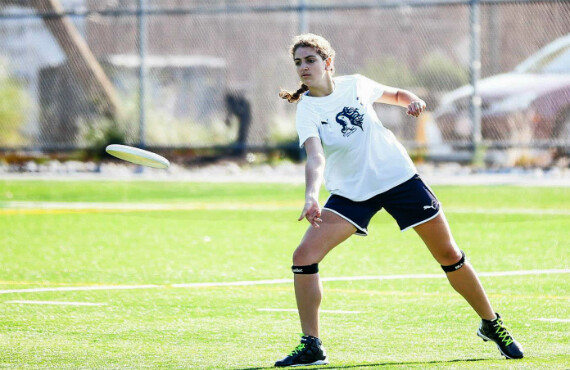Penn Senior Amanda Cornfeld Takes to Medical Research and Ultimate Sport
Amanda Cornfeld, a senior at the University of Pennsylvania, is the ultimate scholar and Frisbee handler. This stellar science researcher is also co-captain of Venus Ultimate, the women’s Ultimate Frisbee team at Penn.
The biological basis of behavior major, Cornfeld currently works in a laboratory at The Children’s Hospital of Philadelphia, studying the neurobiology of stress and has previous medial research experience studying the effects of anesthesia on the development of neurons alongside researchers at the Perelman School of Medicine.
In addition, Cornfeld, who hails from Princeton Junction, N.J., is a member of the academic committee of Nu Rho Psi, the National Honor Society in Neuroscience, and organizes events like faculty lunches, so that students can chat with neuroscience professors in the Philadelphia area.
As a Venus Ultimate, Cornfeld applies her analytical skills and experience working as part of a team to sport.
In a self-officiated sport with no referees or deciding officials, Ultimate Frisbee players rely on the “Spirit of the Game,” which creates a community that enables players to have fair play and respect for even the most competitive of opponents.
The players themselves make calls during the games, which can be stressful because of the mutual appreciation that all the players have for their opponents and the sport, but it serves as one of the most unique parts of playing the game.
“Most people don’t have any exposure to Ultimate Frisbee before they come to college,” Cornfeld, who is a “handler,” the player in charge of throwing and moving the disc up field, on Venus Ultimate, says. “It’s a rapidly growing sport and youth programs are popping up all over the world.”
Cornfeld grew up playing soccer, and for fun often played Frisbee in the backyard with her dad, Mark Cornfeld, a two-time alumnus, who played on Penn Ultimate from 1977 to 1979, before it became the Void.
Following in her father’s footsteps, she began playing competitive Frisbee as a freshman at Penn, signing on as a Venus Ultimate.
“The legend says that we were formed on Valentine’s Day, 1989,” Cornfeld says. “That’s why we’re called ‘Venus,’ after the goddess of love.”
Cornfeld says that in order to play Ultimate Frisbee, one needs to be aggressive in attacking the disc.
“You don’t need to be the fastest person. As long as you can quickly change direction, what we call ‘cutting,’ and explode out of a turn,” Cornfeld says. “You can make it as an amazing cutter without having really great throws, as long as you can get the disc to a ‘handler.’”
To be a great handler, a player has to have a wide arsenal of throws to be able to keep the disc moving at all times. In addition, she says, “field sense” is important.
“Most of our best players come from a field sport like soccer or lacrosse,” Cornfeld says, “because they understand positioning really well.”
But, most importantly, she says, a great Ultimate Frisbee player has to be positive.
“People don’t realize how much one player’s attitude can affect the team,” she says, “and the best players know how to keep a team’s spirits up no matter what. Those are the players that make all the difference.”
For Cornfeld, what makes Venus so special is the social atmosphere that the team has created.
“Just being part of the team is the best part,” Cornfeld says. “The concept of “team” has always been important to me, but it wasn’t until I joined Venus that I realized exactly what being a part of a team means. Our team is a family.”
With social captains who work to foster friendships among incoming rookies and veteran players alike, it fosters a strong bond among its players, Cornfeld says. Venus players share potlucks, study sessions, movie nights and post-practice dinners.
Cornfeld says the team always rolls out the welcome mat for new players who are interested in Ultimate Frisbee.
“As a co-captain, nothing makes me happier than seeing the players who started in September excelling and seeing sophomores who have only been playing for a year, still working every single day to become better," Cornfeld says.
After graduation, Cornfeld plans to take a year to do clinical research before going to medical school.








